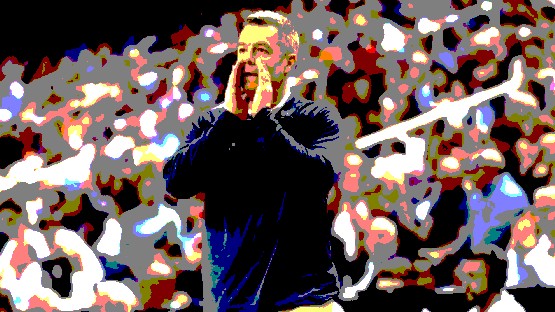
Not only is the book out on how to beat Tony Bennett, the second edition is at the printer.
It’s been five years since Bennett led Virginia to a national championship.
Also five years since Virginia has won an NCAA Tournament game.
The most recent postseason meltdown, that flaming 67-42 pile of dung of a loss to Colorado State laid last night in the UD Arena in the First Four, seems to have finally gotten Bennett’s attention.
You’ve no doubt seen the headlines.
What I’ll tell you here is, they don’t do justice to the obvious soul-searching that Bennett obviously had been thinking about before he headed to the podium after the loss.
“We’ve raised the bar really high here. We’ve qualified for this tournament, which is not an easy thing. We’ve done well,” Bennett said, then, later in the same thought, went on to add: “You know, it’s something that I’ll always look in the mirror after every year and say, OK, what adjustments, we gotta get the right pieces in place.”
I’d argue that Bennett hasn’t had an issue with having the right pieces in place; it’s just been, how he uses the pieces on his roster, particularly with this year’s group.
Starting on the offensive end: this year’s Virginia team ranked (gulp!) 211th nationally in offensive efficiency, per KenPom.
For context, I never thought I’d see another team as bad on offense as the 2019-2020 team, which ranked (double-gulp!) 232nd in offensive efficiency in KenPom, and yet had a 4-1 record in games in which it scored in the 40s.
That team finished second in the ACC and was 23-7 overall, with 11 wins in its last 12 games, because it was so freakishly good on defense, ranking first in the nation in adjusted defense.
This year’s group was pretty good defensively, ranking seventh nationally, but clearly not good enough to overcome its offensive deficiencies – to wit, UVA was 1-6 in games in which it scored in the 40s this year, which is more like it; you shouldn’t win when you can’t get out of the 40s, right?
No offense
The reason for all the games in the 40s, and the struggles to score in general, is, that book that is out on how to beat Tony Bennett.
Starting with the offense, with the base being mover-blocker, also called sides, which is a read-and-react motion offense in which two forwards (the blockers) are continuously setting screens for the guards (the movers), the goal being to create openings off those screens, either for the guards to be able to attack the paint, to shoot in the midrange, or, if they flatten out, on the perimeter; in addition to being able to create shots for the bigs off rolls to the baskets or pops out to the perimeter.
This is the bulk of what Bennett’s teams do on offense, dating back to his early days at Virginia, his time at Washington State, and to Dick Bennett, his father, who made it from the D3 ranks to the Final Four at Wisconsin.
Even the ancillary set that Bennett has added on in recent years, what some people call middle-third, uses similar screening action, just moving it from the sides of the lane to the middle of the floor.
When you have the level of talent that the 2013-2016 group had – Malcolm Brogdon, Joe Harris, Justin Anderson, Anthony Gill, all future NBA players – the abundance of shooting and creativity from the guards and the finishers in the post makes mover-blocker a tough guard.
The 2017-2019 group – De’Andre Hunter, Ty Jerome, Kyle Guy – was more guard-heavy, but they were so good from the perimeter that the lack of scoring punch in the post wasn’t an issue.
Over the past five years, Bennett hasn’t had the right pieces to fit the scheme, even though he had great pieces – for example, the 2020-2021 team, which had future NBA guys Sam Hauser, Trey Murphy and Jay Huff, and last year’s group, which had two veteran point guards, Kihei Clark and Reece Beekman, a capable perimeter scorer in Armaan Franklin, and a post scorer in the mold of Gill, in Jayden Gardner.
The 2021 and 2023 teams each won ACC regular-season titles, but flamed out in first-round NCAA Tournament games, the first because of an off shooting night (UVA was 21-of-60 from the floor in the 62-58 loss to Ohio in 2021), the second, to just a perfect storm (the 66-64 loss to Furman last year, blowing a 12-point second-half lead, missing free throws in the last minute, a bad-pass turnover leading to a game-winning 30-foot three with two seconds left).
The 2023-2024 team has two projected NBA Draft picks in Beekman and Ryan Dunn, a solid college perimeter shooter in Isaac McKneely, ubertalented Top 50 national recruit Elijah Gertrude, who barely got on the floor, and then a bunch of replacement-level guys that didn’t fit into the offensive scheme, but got tons of minutes.
Running the base offense anyway with that group resulted in Virginia playing an awful lot of 2-on-5 on the offensive end, and as we got deeper into the season, it became obvious to opposing coaches to assume the risk of leaving Dunn open on the perimeter, to just leave Andrew Rohde out there with open looks, almost daring him to shoot it, to not be all that fearful of Jordan Minor and Blake Buchanan on pocket passes into the post.
Five of the seven games in which Virginia scored in the 40s came in the last nine games of the season.
The book is out, and it’s apparently a bestseller.
The defense: creaky
The hell you say, right? Didn’t you just tell us that UVA ranked seventh nationally in KenPom?
I did. But keep in mind, that’s a season-long measure. In too many single games, Bennett’s Pack Line, inherited from his father, who supplemented his income during his D3 coaching days by selling instructional tapes spelling out the principles of the Pack Line from the back of his station wagon, found itself picked apart.
Last night, for instance: Colorado State shot 55.3 percent, and a lot of that was because the Rams were 15-of-20 on shots at the rim.
The Pack Line defense is designed to limit shots at the rim, but there is a cheat code for how to beat it: if you spread the floor to allow for cuts and one-on-ones, the Pack isn’t there to help, and the back end is exposed.
We saw that last night, we saw it in the 73-65 ACC Tournament loss to NC State (which was 15-of-22 at the rim), the 75-48 loss at Duke (which was 18-of-29 at the rim), the 75-41 loss at Virginia Tech (which was 16-of-21 at the rim).
Coaches that could spread the floor could get one-on-one matchups (State’s DJ Burns, Duke’s Kyle Filipowski) and backdoor cuts (Virginia Tech did that all night down in Cassell Coliseum) ahead of the Pack Line’s double-teams designed to take away the high screen-and-roll and traditional post-ups.
It’s almost to the point that a coach has to be stubborn to stick to whatever offense he runs that plays into what the Pack Line is designed to take away (looking at you, Hubert Davis), knowing what the book has to say about beating the Pack Line.
What Bennett is saying, and what he seems to realize he needs to do
Bennett had a lot to say after last night’s pantsing.
It was almost like he was in a therapy session: unloading, unburdening.
First, on the offense:
“I think teams started really zoning off, gapping up on some guys and just making it so hard for Reece and Isaac. They kind of face-guarded, zoned off. And I want to say they got a little bit of a blueprint on how to bother us. We tried to come up with some different things, and I thought we played good ball against NC State and even BC and Georgia Tech at the end. But a lot of it was predicated; we needed to make some shots, and the free throws, but we had to hit some shots just to give us a chance. But it was hard because of how it was jammed in the lane, zoned off of guys and really face guarding or making it difficult on the others. And I think that kind of started happening as people saw, well, here’s a way to maybe make it real challenging on us.”
Next, on the defense:
“I thought our defense unraveled. Even when we were in front their physicality bothered us. They sort of lowered their shoulder and moved our guys, and they scored right at the paint. And it just kind of, there is a feeling of you felt that before probably a few times.”
There’s plenty of uninformed speculation out there – I hate to concede, launched into the public sphere by my AFP colleague, Scott German, the real-life inspiration for SNL’s Debbie Downer – that Bennett isn’t long for the college sports game, that he’s frustrated, like Jay Wright and Nick Saban, with the way college athletics is changing with NIL and the transfer portal.
I didn’t see the game on TV last night, because I was courtside in the arena, but I understand that the TV cameras caught Bennett’s extended family in attendance, which is apparently fueling speculation that maybe there was a big turnout of Bennetts because of a thought that last night might have been his last game as a head coach.
I’m not buying that, because of how Bennett addressed the postgame questions about the future of his program, with answers that revealed that he has been putting some serious thought to what he needs to do to get things moving like they were from 2014-2019 again.
Here’s what he had to say to that:
“It’s frustrating because before that, we’ve been to a couple of Sweet 16s and an Elite Eight and a national championship. But there have been some hard losses in the first round. That’s frustrating.
“Some are unique, a COVID pause, key players getting injured. And I think, absolutely, I always have to examine our ability to advance. We’ve raised the bar really high here. We’ve qualified for this tournament, which is not an easy thing. We’ve done well.
“But it’s stung to get to this point and not advance. So, of course, we’ve got to keep adding quality players. We’ve got to look at things, certainly, from a system standpoint, absolutely.
“And I wish we could have played better and played quality because we were so excited to get this chance, because this team maxed out for the most part in the regular season at times, and this happened.
“But you know, it’s something that I’ll always look in the mirror after every year and say, OK, what adjustments. We gotta get the right pieces in place. So I think it’s probably both, to be honest.”
Translation: he knows he needs to find more talents, and he knows that he needs to put those talents into better positions to be able to win games.










